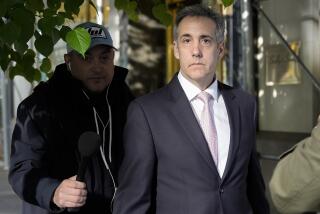Key Witness Denies He Threatened Silberman : Trial: Government informer contradicts Silberman’s claim that he was coerced into money deal.
- Share via
Asserting that there were no threats, government informer Robert Benjamin said Tuesday that he did not pressure Richard T. Silberman into completing the second of two deals at the heart of the money-laundering trial against the San Diego financier.
Directly contradicting Silberman’s testimony on a key defense theme, Benjamin said he did not make either of two early 1989 phone calls Silberman claimed to have received from the eight-time convicted felon. It was in those calls that Benjamin made the threats, Silberman testified last week.
Benjamin, however, said Tuesday that he did not make the calls because he did not have Silberman’s phone numbers. He added that he thought it was “ridiculous” to suggest he had made threats against Silberman, a one-time aide to former Gov. Edmund G. Brown Jr.
Though most of his testimony involved sparring with Silberman’s defense attorneys, Benjamin never lost his composure. He appeared to be wryly amused at once again finding himself in a courtroom.
Silberman, 61, who is standing trial on seven felony counts, showed no emotion as he listened to testimony from Benjamin, a New Yorker who is in the federal witness protection program.
Silberman is charged with laundering $300,000 that an undercover FBI agent allegedly characterized as Colombian drug profits. Testimony in his trial, which begin May 18 before U.S. District Judge J. Lawrence Irving, is due to conclude today.
The jury will get the case after closing arguments Friday.
The case involves two transactions involving cash supplied by the undercover agent, Peter Ahearn, who was posing as Pete Carmassi, a front man for Colombian drug lords.
The first deal is a November, 1988, swap of $100,000 for stock in a Silberman gold mine subsidiary. The second is a February, 1989, exchange of $200,000 for U.S. Treasury bonds.
Silberman maintains the first deal was simply a legitimate stock sale. As for the second, he testified last week that he was coerced into it by threats aimed at his family, claiming Benjamin made them in phone calls Jan. 5 and Feb. 4, 1989.
A central element of defense strategy, throughout months of pretrial hearings and in questioning of various witnesses during the trial, has been a focus on Benjamin and the purported threats. Benjamin testified at the request of defense attorneys, not prosecutors.
Curiously, however, lead defense lawyer James J. Brosnahan never asked Benjamin at any time Tuesday--or during Benjamin’s initial, brief appearance last Friday on the stand--about the purported January and February threats.
Assistant U.S. Atty. Charles F. Gorder Jr., the lead prosecutor in the case, finally asked whether Benjamin had ever threatened Silberman. “Never,” Benjamin said.
Benjamin said he could not have made the Jan. 5 phone call to Silberman’s office.
“I didn’t even have his office number,” Benjamin said.
He added that he also could not have made the Feb. 4 call, which was to Silberman’s home. “I never had his number,” Benjamin said. “I never called him.”
Instead of asking about the January and February threats, Brosnahan sought primarily to ask about various threats and crimes the defense team contends Benjamin--whose eight convictions include bookmaking and bank fraud--has been involved in over the years.
Irving, however, refused to allow Benjamin to answer questions on unrelated topics. However, the judge said he may convene a separate hearing to consider the defense contention that Benjamin’s past made it “outrageous” for the FBI to use him in the case against Silberman.
Brosnahan also focused on a March, 1989, meeting involving Benjamin, Carmine DiNunzio and Jack Norman Myers.
DiNunzio is an associate of reputed mobster Chris Petti, through whom Silberman met Ahearn. Myers, a Malibu investment banker who was charged with being a courier in the alleged money-laundering scheme, pleaded guilty in mid-May to one felony count and agreed to testify against Silberman, which he did May 31.
The meeting, a lunch at an Encino hotel, was called to discuss why the value of the bonds that were delivered in the second deal was perhaps $50,000 less than Ahearn had expected. Discussing the shortfall, DiNunzio “got threatening,” Myers testified a couple of weeks ago.
Benjamin said Thursday that he agreed with DiNunzio that Myers--and Silberman--had to make up the difference. But he said he “didn’t agree with the threats,” which he called “veiled at best.”
The threats have not been explicitly described in court.
Following Benjamin’s recital of the lunch conversation, Brosnahan suggested to Benjamin that the meeting was “not the first time you’ve threatened Mr. Silberman.” “That’s an absolute lie,” Benjamin said.
Brosnahan immediately contended that since Benjamin was on the FBI payroll, the informer had a financial motive to make the case against Silberman a good one.
“I always need money,” Benjamin said.
But he added: “Mr. Silberman needed money, not me. He sent for me. I didn’t send for him.”
More to Read
Sign up for Essential California
The most important California stories and recommendations in your inbox every morning.
You may occasionally receive promotional content from the Los Angeles Times.










